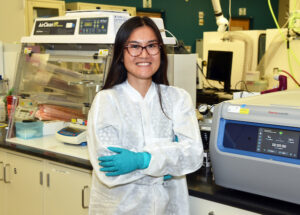
Story by Burrell Parmer
Naval Medical Research Unit San Antonio
JOINT BASE SAN ANTONIO-FORT SAM HOUSTON – (May 20, 2024) – The United States is the greatest country in the world, not only because it is a superpower but strongly for its diversified citizenry.
During the month of May, the Department of Defense (DoD) celebrates Asian American, Native Hawaiian, and Pacific Islander Heritage Month (AANHPIHM) acknowledging the contributions of Asian Americans, Native Hawaiians, and Pacific Islanders in defending America’s freedom.
Being recognized from Naval Medical Research Unit (NAMRU) San Antonio is Dr. Dao Ho, a research immunologist, within NAMRU San Antonio’s Combat Casualty Care & Operational Medicine (CCC&OM) Directorate.
Ho, born in Qui Nhon, Vietnam, leads a team of researchers assigned to the Cellular and Immune Based Adjuncts for Casualty Care (CIBACC) Department which develops and evaluates therapies to mitigate adverse responses following injury. Her department conducts a diverse range of Research, Development, Test and Evaluation (RDT&E) from investigations of potential pain management therapeutics, resuscitative fluid adjunct drug assessments, real-world and laboratory evaluations of devices for the treatment of penetrating injuries, and stem cell and immune based therapeutics intended to improve warfighter outcomes and survival.
Earning her doctorate from the University of North Texas, Ho has been serving as a Navy civilian for two and a half years. Prior to joining NAMRU San Antonio, she served as an Army civilian at Tripler Army Medical Center in Hawaii for six years.
According to Ho, the Navy has allowed her to be part of an amazing mission to provide better medical care to warfighters both on and off the battlefield.
“I have been able to develop and build new capabilities for NAMRU San Antonio which include complex in vitro platforms for the study of military-relevant injuries and the screening of novel therapeutics for resuscitation and traumatic injury,” said Ho, who has been in the field of research for 25 years. “I have also been able to lead an amazing team of research technicians and scientists to carry out studies that have greatly contributed to the advancement of knowledge and products in the area of resuscitation, endotheliopathy, wound-healing, toxicants, and directed energy exposure.”
Ho, who came to America as a young refugee, said working at NAMRU San Antonio is important to her because it is truly rewarding to know that what she does each day can have a significant impact on the lives of warfighters.
“I love to continuously learn new things, and the Navy has allowed me to capitalize on my strengths to advance Navy Medicine,” said Ho. “Those strengths include my ability to quickly solve problems, and to train and lead a team to successfully execute projects.”
Raised in Dallas, Ho plans on making the Navy a career. One of her personal goals is to advance the health care of military working dogs (WMD).
“The best part of working for Navy Medicine is knowing that I am part of a team driven to make a difference in the health and well-being of our fighting force,” said Ho. “Also, I love dogs, and when I retire, I plan to be part of a non-profit organization that rehabilitates injured and/or neglected dogs to include other animals.”
A member of the American Physiological Society (APS), Ho has volunteered in numerous activities to enhance the relationship between the public and research scientists.
“I volunteer to educate young students (K-12) and provide mentorship to budding young scientists about the importance of scientific research,” said Ho. “I have served on many career panels that provide insight into non-academic careers.”
According to Ho, some in the public have a negative perception of science and research because they do not fully understand what the research science community does.
“My job is unique in that, as a Navy research scientist, I must always pivot to study new and evolving topics that arise as the landscape of warfare and national security changes,” said Ho.
NAMRU San Antonio’s mission is to conduct gap driven research to improve survival, operational readiness, and safety of DoD personnel engaged in routine and expeditionary operations.
It is one of the leading research and development laboratories for the U.S. Navy under the DoD and is one of eight subordinate research commands in the global network of laboratories operating under the Naval Medical Research Command in Silver Spring, Md.